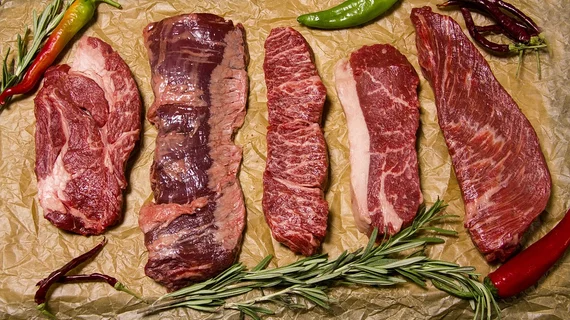Two new studies confirm replacing red meat with plant protein lowers risk of dying, heart disease
Another round of studies prove that consuming red and processed meat is bad for health. The studies, both from Harvard researchers, were presented at the American Heart Association’s EPI Scientific Sessions.
The studies follow a wave of controversy surrounding red meat studies, after a guidance published last year in the Annals of Internal Medicine stated consuming red and processed meat had little to no negative impact on health. The publication later issued a correction after one of the authors of the guidance failed to declare his links to previous meat industry-funded research.
The first study compared the health impacts of eating animal protein versus plant protein, controlling for daily calories. Researchers looked at a group of 37,000 Americans, average age of 50, and found that those who ate the most plant protein were 27% less likely to die of any cause compared to those who ate the least amount of plant protein. This group also was 29% less likely to die of coronary heart disease.
Researchers estimated plant protein versus animal protein that people consumed in the study and compared it to the risk of dying, according to a press release, while keeping the number of calories consumed consistent. They used data from eight National Health and Nutrition Examination Surveys from 1999 to 2014, identifying cause of death through the National Death Index.
Even small changes of less animal protein and more plant protein were associated with better health. For example, replacing just 5% of daily calories from total animal protein to equivalent calories of plant protein was lined to a 50% lower risk of dying of any cause, including coronary heart disease. In addition, changing 2% of calories of animal protein to plant protein was associated with a 32% lower risk of dying.
However, it was critical to replace animal protein with health plant proteins, including nuts, legumes and whole grains that have other nutritional benefits such as healthy fats, antioxidant vitamins, minerals and phytochemicals. These beneficial elements have been shown to reduce disease risk.
“It isn't enough just to avoid red meat––it's also about what you choose to eat in place of red meat,” lead study author Zhilei Shan, MD, PhD, postdoctoral research fellow in the department of nutrition at Harvard T.H. Chan School of Public Health in Boston, said in a statement.
The second study analyzed the impact of servings of red meat, finding substituting just one serving per day of red or processed meat with nuts, legume, whole grains and dairy dropped the risk of coronary heart disease in men 47%.
"On average, Americans eat approximately 3.5 servings of red meat each week, and about one-third have red meat daily. Our findings suggest that even partial replacement of red meat with healthy, plant-based sources of protein could substantially reduce rates of coronary heart disease in the United States," lead study author Laila Al-Shaar, PhD, a postdoctoral research fellow in the Harvard T.H. Chan School of Public Health's Cardiovascular Epidemiology Program, said in the same press release.
Researchers also found swapping a serving of red meat for nuts, while keeping calories the same, dropped the risk of dying of a heart attack 17%, while replacing that serving with whole grains lowered the same risk 48%.
“Eating more plant protein -in place of red meat, especially processed red meat, appears to be a good strategy for a healthier diet and better health," Eduardo Sanchez, MD, MPH, FAAFP, the chief medical officer for prevention at the American Heart Association, said in a statement.

